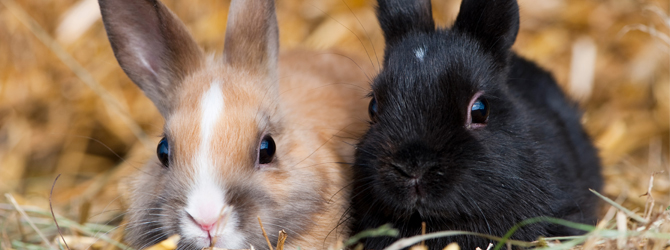Caring for your rabbit's teeth
First Published: 05/02/2019
Last Updated: 31/10/2023
Rabbits are perhaps more prone to dental health problems than cats and dogs. This is because unlike cat and dog teeth, rabbit teeth are constantly growing! Owners must stay vigilant to keep their bunnies comfortable and safe from discomfort with their teeth. Let’s take a look how to keep your bunny’s teeth in great condition.
Do your research
It’s important to know how your rabbits’ teeth work. They grow by approximately 2mm every week and in the wild, rabbits keep their teeth at a consistent length by gnawing constantly on hay or grass.
Problems in rabbit teeth are less likely to stem from hygiene or cleanliness, and more likely to occur as a result of too much growing. If a rabbit’s top teeth grow too long, they stop being able to meet the bottom teeth correctly – this is known as malocclusion. If left untreated, malocclusion can have a knock-on effect on the rest of your bunny’s teeth, causing them to become pointed, sometimes rubbing painfully against the inside of the mouth (causing nasty ulcers) and sometimes growing inwards into the rabbit’s jaw and sinuses.
Feed the correct diet
Feeding your bunny the correct diet is the most effective action you can take to ensure that their teeth stay in good condition. A rabbit’s diet should consist of at least 85% hay or grass, and you should make it available to them throughout the day – just as it would be in the wild.
The act of grazing and gnawing allows the teeth to wear against each other and stay at the ideal length. Feeding your rabbit the correct nutrients will also help keep their teeth healthy – ask your vet about the best possible diet for your bunny.
Know the symptoms
Because rabbit teeth problems don’t often come from lack of cleanliness, their symptoms might not include bad breath, which is probably the first giveaway of dental problems in dogs or cats. You should contact your vet if your rabbit displays any of these signs:
- Drooling (watch out for damp or matted fur around their mouth)
- Losing weight (your rabbit is less likely to eat if it hurts them to do so)
- Excess hay around their enclosure (further evidence of not eating)
- Untidy or unclean fur (rabbits use their teeth to self-groom, so won’t be able to keep themselves clean if their teeth are sore)
- Lumps around the jaws (if abscesses are forming as a result of malocclusion)
Check regularly
Now that you’re familiar with the symptoms of dental health problems in rabbits, make sure that you check up on your bunnies regularly – every morning and every evening if you can. This is a good habit to get in to and as well as their teeth, you can check their fur for flystrike, their enclosure and their general condition. Your rabbit should also have regular check-ups with the vet.
Need more info?
If you’re concerned about any rabbit teeth problems that might affect your bunny, have a chat with your vet.
Find your nearest vet using our Find a Vet page, or speak to a vet online using Online Vets.


